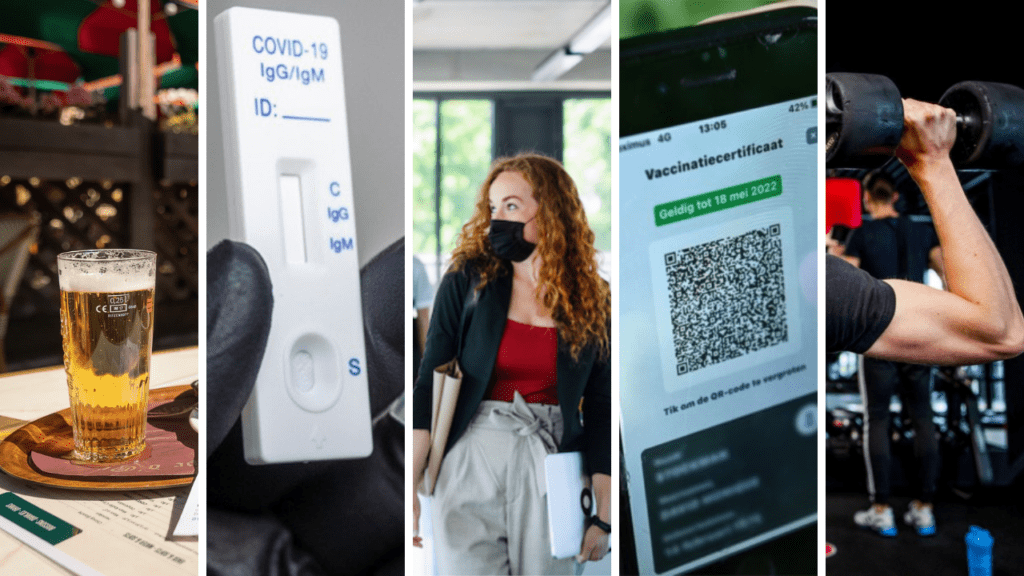As the epidemiological situation in Belgium is getting worse again, the authorities have activated the pandemic law and are reversing some of their previous relaxations from today.
From face masks and teleworking over the precise use of the Covid Safe Ticket (CST) to the activated pandemic law, here’s an overview of the rules in force from Friday 29 October.
"We had hoped that the positive evolution [of the coronavirus figures] would continue, but the reality is different today," Interior Affairs Minister Annelies Verlinden said in a press release.
All measures included in the Royal Decree enter into force today and will apply until 28 January 2022. However, the Consultative Committee will make a new assessment in mid-November, according to Verlinden's cabinet.
Pandemic law
As all criteria for the existence of an epidemic emergency, as provided for in the Pandemic Act published on 20 August 2021, are currently met according to the authorities, the Federal Government declares the epidemic emergency, effectively activating the Pandemic Act.
"The Pandemic Act provides a specific legal basis for taking measures to limit the impact of the pandemic on public health," Verlinden said. "This is the first time the law has been applied."
The Royal Decree declaring the epidemic emergency is being published on Friday and enters into force immediately, for a period of three months.
Additionally, last year's first Ministerial Decree on urgent measures to limit the spread of the coronavirus published on 28 October 2020, will be lifted and replaced by the new Royal Decree with the current administrative police measures, and the latest decisions of this week's Consultative Committee.
Teleworking
Working from home is once again "strongly recommended" in all companies, associations and services for all staff members whose job allows them to do so.
Face masks
Wearing a face mask remains strongly recommended in all situations where it is impossible to comply with the rules of social distancing.
On top of that, wearing a mask is mandatory:
- in publicly accessible areas of companies, associations and services,
- in publicly accessible areas of shops and shopping centres, and commercial establishments,
- in libraries, toy libraries and media libraries,
- in all publicly accessible indoor areas of establishments in the cultural, festive, sporting, recreational and event sectors,
- in places of worship and buildings intended for the public exercise of non-denominational moral services,
- in the public and non-public areas of the courthouses, as well as in the courtrooms when moving around and, in other cases, following the instructions of the President of the Chamber,
- in the publicly accessible areas of government buildings,
- in hospitality businesses (such as bars and restaurants) and in fitness centres, by all staff members,
- in closed places of public transport and organised collective transport,
- during a visit to a "contact profession" (such as hairdressers, tattoo artists, beauticians) in case of direct physical contact or when the 1.5 metres social distance cannot be guaranteed for at least 15 minutes, for clients as well as service providers,
- for staff, organisers and the public at events, cultural and other performances, sports competitions and training sessions, and conferences with over 200 people indoors and over 400 people outdoors - without using the Covid Safe Ticket (CST),
- in the closed areas of hospitality establishments, for customers on the terrace when they briefly enter this closed area, if access to the terrace is not regulated by a CST.
Wearing a face mask is not compulsory:
- in situations where access is organised using the CST (except for staff in the hospitality industry and fitness areas),
- during indoor events, cultural and other performances, sports competitions and training sessions, and conferences with an audience of fewer than 200 people,
- during outdoor events, cultural and other performances, sports competitions and training sessions, and congresses with an audience of fewer than 400 people,
- during private meetings.
The Covid Safe Ticket
The authorities lowered the threshold to use the CST at events again, to 200 people indoors (down from 500) and to 400 outdoors (down from 750).
Organisers of an event with a smaller audience can also decide to make use of the CST, provided the visitors are informed in advance.
Additionally, the regions, provincial governors and/or mayors can lower the minimum numbers or make the use of the CST compulsory for all public events on their territory. The other rules for mass events remain unchanged.
For events with an audience larger than 200 people indoors and 400 people outdoors that do not use the CST, a number of specific rules - social distancing, face mask obligation - still apply.
The CST remains compulsory in discos and dance halls.
From Monday 1 November, the CST rules for the other sectors (such as the hospitality industry, sports and fitness centres, trade fairs and congresses, cultural, festive and recreational establishments, residential care for vulnerable persons) are decided by the regions.
More information about the application in Flanders, the Brussels-Capital Region and Wallonia from Monday can be found here.
Air quality meters
The use of an air quality (CO2) meter was already mandatory in closed areas of facilities belonging to the sports, events and hospitality sectors.
In the enclosed areas of facilities where mass events take place, air quality meters are now also mandatory starting from an audience of 200 people.
If the air quality guideline standard of 900 ppm (parts per million) is exceeded, the operator still has to have an action plan to get the number down.
Travel
In addition to the PCR test, a Rapid Antigen Test with a negative result will now also be accepted, provided that the test was carried out by a professional, no more than 36 hours prior to arrival on Belgian territory.

